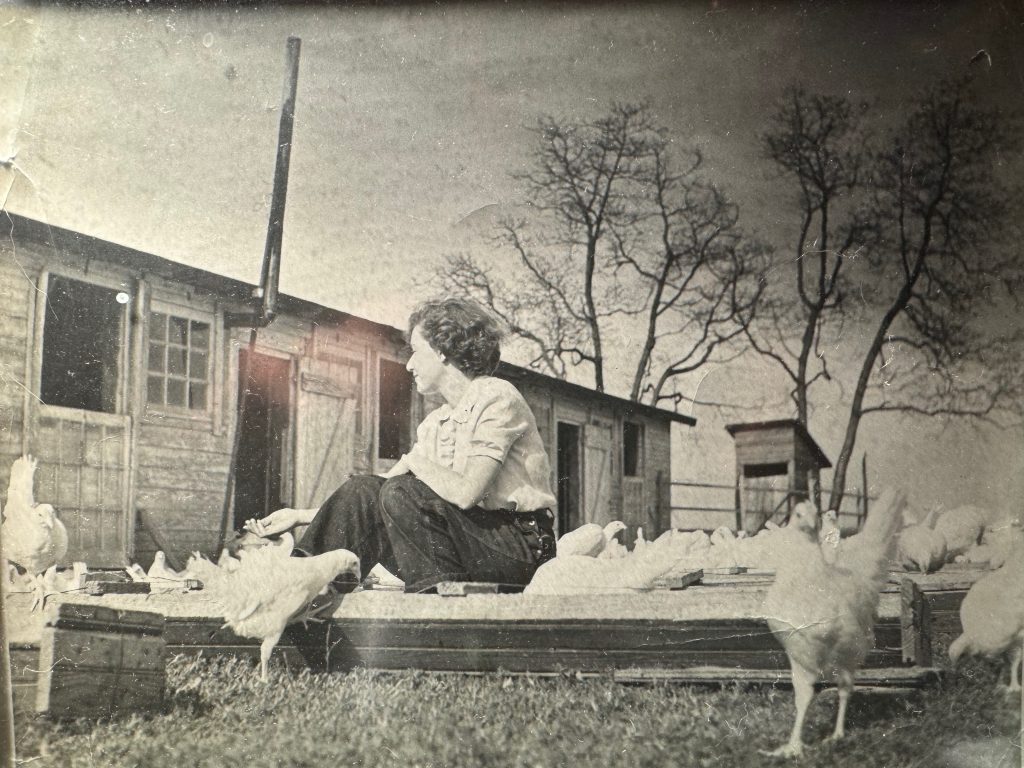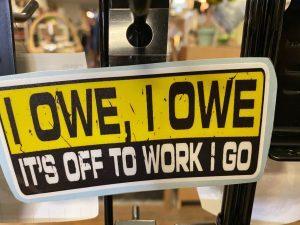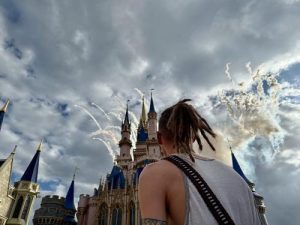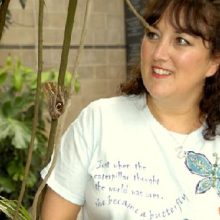WATCH THE YOUTUBE VERSION OF THIS CARD
“I have claimed that Escape is one of the main functions of fairy-stories, and since I do not disapprove of them, it is plain that I do not accept the tone of scorn or pity with which ‘Escape’ is now so often used. Why should a man be scorned if, finding himself in prison, he tries to get out and go home? Or if he cannot do so, he thinks and talks about other topics than jailers and prison-walls?”
— J.R.R. Tolkien
Do you feel trapped in some way? It’s a universal and appropriate feeling given all the constraints of human incarnation. You may feel trapped by location, politics, employment or unemployment, relationships or lack thereof, bodily condition and many other classic oppressive factors.
This card had a strange origin story on Feb. 18 of 2024, the day I’m writing this. Waking up mornings, finding myself once more in a sixty-six-year-old body, I often feel trapped by mundane limitations.
Creatively, it’s ideal for me to awaken long before dawn and get sealed into my study before anyone else in the household is awake. Predawn, most people in the surrounding neighborhood are in the dream time. For me, it’s the most magical time of day when the forces of mundanity are dormant, and psychic noise, which I’m sensitive to, is low.
See: Predawn Window Zone
By around 7 AM, there’s a sense of workers waking up and getting ready to commute. I can feel all the machinery of routinized life winding up. But if I’m already in the midst of a writing session, enclosed in my blackout-curtained study with noise-canceling headphones on, creative momentum can carry me past this dreaded zone without interference.
Unfortunately, I had stayed up long past midnight and awoke to sounds of activity downstairs, breakfast smells, full daylight streaming through windows, and the machinery of ordinary life up and running.
When I miss the inviting and mysterious predawn quiet, it exacerbates morning irritability during the 90 minutes or so of exercises and tasks I need to do to get my body back online and everything ready for a writing session. But while I was in that irritable, anti-magical zone, the world was actually in a state of interactive enchantment.
Upon awakening, I’d put on noise-canceling headphones and sought out creative audio content to compensate for the mundanity. Synchronistically, the two things I chose to listen to directly addressed my oppressed mood and presented me with the theme of this card.
While stretching, I listened to Lev Grossman’s Magician trilogy, specifically a part that was like a disillusioned, post-modernest version of a C.S. Lewis story. Five British children, siblings, have discovered a magical world called Fillory. One of them, Ruppert, now a young man, is writing about Fillory while he’s in London during World War II as the city is being destroyed by the Blitz. Ruppert narrates that three out of five of his siblings, including himself, came to visit and think of Fillory less and less as they got older and more engaged with the ordinary world. Ruppert has become ever more disenchanted with Fillory as it turns out to be even darker than the mundane world and permanently entraps two of his siblings. His brother Martin hated London and had lost some of his innocence there, but in Fillory, he lost all of it and became monstrous. Ruppert realizes,
“Fillory was cruel, as cruel in its way as the real world was. There was no difference, though we all pretended there was. There was nothing fair about Fillory, just as there was nothing fair about people’s fathers going to war, and their mothers going mad, and the way we among all animals were cursed with a longing for somewhere better, somewhere that never existed and never would. Fillory was no better than our world. It was just prettier.”
Grossman, Lev. The Magician’s Land: A Novel (The Magicians Book 3) (p. 235). Penguin Publishing Group. Kindle Edition.
It’s a key insight — you can become trapped in the unconscious and other dimensions as much as you can in ordinary life. Middle Earth has Rivindell but also Mordor. There are lighter and darker zones everywhere. In Fillory, Ruppert follows Martin into a liminal, unformed zone:
“This was new. Martin had taken us somewhere truly strange. Fillory was a land of wonders, but this place had an uncanny quality that I can only describe as not correct. It was a place that shouldn’t have been, somewhere off the edge of the board, where you weren’t meant to put a playing piece down.” (ML p. 230)
To enter incarnation is to enter the realm of story — a narrative that has a beginning and an end — birth and death —- and there is no more classic story element than feeling trapped by fate and having to undergo a difficult journey to break free.
After listening to some of The Magician’s Land, it was time to stand on my whole-body vibration machine for twelve minutes. My custom is to shift to video content on my IPad for this; otherwise, I’d just be staring at the wall. I watched the last part of the last episode of the superb series, The Power of Film. According to TCM,
“THE POWER OF FILM is a 6-part television event from legendary UCLA film Professor Emeritus Howard Suber, analyzing why certain films have remained both popular and memorable for generations.”
The whole-body vibration came to reverberate through my whole psyche as Suber brought the theme of the morning into consciousness. He concludes the series with The Wizard of Oz and points out, “As far as I can tell, no movie is more loved than The Wizard of Oz, so that’s where we are going to end . . . It’s central character is trapped, is lost . . . ”
Suber began the series by pointing out that the central theme of the most popular movies is being trapped by fate. It’s the most universally appealing theme because it’s how most of the audience feels in their lives. In The Shawshank Redemption, the hero, Andy (played by Tim Robbins), has been wrongly convicted of murder and is trapped in Shawshank State Penitentiary serving two consecutive life sentences. In Shawshank, he endures rape and is punished with long solitary confinement.
But Andy does not abandon hope, and for nearly twenty years, he chips away with a small rock hammer to carve a tunnel from his prison cell. Finally, he escapes by crawling through an excrement-filled sewer pipe.
See the escape here: https://www.youtube.com/watch?v=YvPerZLPnm4 slide to 2:00
As Morgan Freeman’s voice-over narrates,
“Andy crawled to freedom through five hundred yards of shit-smelling foulness I can’t even imagine, or maybe I just don’t want to. Five hundred yards . . . that’s the length of five football fields, just shy of half a mile.”

Andy emerges from the sewer into a stream and cleansing rain in one of the greatest scenes of fulfilled escape desire in movie history.
The Wizard of Oz begins with Dorothy, an orphan living a lonely life with a foster family in black-and-white Kansas (a grim world, especially in the novel, of meager subsistence farming). She feels trapped in this world and expresses her desire to escape in the song, Somewhere Over the Rainbow.

Watch it here. https://www.youtube.com/watch?v=oW2QZ7KuaxA
The lyrics of “Somewhere Over the Rainbow” exemplify the universal longing to escape incarnation from our troubled matrix:
When all the world is a hopeless jumble
And the raindrops tumble all around,
Heaven opens a magic lane.
When all the clouds darken up the skyway
There’s a rainbow highway to be found,
Leading from your window pane
To a place behind the sun,
Just a step beyond the rain.
Somewhere over the rainbow, way up high,
There’s a land that I heard of once in a lullaby.
Somewhere over the rainbow, skies are blue,
And the dreams that you dare to dream really do come true.
Someday I’ll wish upon a star and wake up where the clouds are far behind me.
Where troubles melt like lemon drops away above the chimney tops,
That’s where you’ll find me.
Somewhere over the rainbow, bluebirds fly.
Birds fly over the rainbow; why, then, oh why can’t I?
(orchestra interlude)
Someday I’ll wish upon a star and wake up where the clouds are far behind me.
Where troubles melt like lemon drops away above the chimney tops,
That’s where you’ll find me.
Somewhere over the rainbow, bluebirds fly.
Birds fly over the rainbow; why, then, oh why can’t I?
If happy little bluebirds fly beyond the rainbow,
Why, oh why can’t I?
As Suber narrates, “Desire. This deep desire to get out of here, out of this trap . . . She wants to get out of this place.”
The Wizard of Oz is the most beloved movie of all time because it expresses that universal longing to escape our oppressive matrix. It was a longing I felt growing up during the most dangerous decades of the Bronx. One time, as a young teenager, I was feeling oppressed by the ugliness of the NYC subway system and my life in the Bronx when I entered a long underground passage and found a brilliant saxophonist doing a surrealized blues rendition of “Somewhere Over the Rainbow” that echoed in the reflective acoustics of the ceramic-tiled passage. The elongated notes dilated time as though the sax were expressing the underlying mood of the whole city. It was one of the most haunting musical moments of my life, erasing the boundary between inner longing to escape and the outside world.
Growing up, I also had glowing moments of escape. When I was a small child, we took memorable trips to visit my grandparents who lived on a ten-acre chicken farm that seemed to exist in an alternate dimension.

My mom, Bernice Zap, at her parent’s ten-acre chicken farm.
Then, there was my first night escaping the Bronx for a Jewish socialist summer camp in the Catskills. Living in a metropolis, on a clear night, a half dozen stars might be dimly visible. At the camp, far from light pollution, I was stunned by a galaxy of brilliant stars in the night sky. The hippie counselors who ran this camp took me to my first rock concert, where I saw Jethro Tull opening for the Who and discovered the magic of the sixties.
Finally, at sixteen, I escaped the Bronx for what felt like a different planet — a small private college in Pennsylvania. I remember looking out my dorm room window that first night. Instead of seeing the elevated #4 train rattling past my window, I saw the idyllic, woodsy campus that had just become my new world.
There was another haunting moment when I was twelve or thirteen that filled me with longing for greater adventure. I was with my family in Kennedy airport about to board an amazing new aircraft, a 747, to travel to Europe. I was thrilled to explore this unfamiliar continent, but we were going on a canned package trip by the American Express credit card company. These packaged European tours for Americans were so popular and stereotypical that a movie about them called If it’s Tuesday, this Must be Belgium, came out in 1969, about a year before went on this trip.
As we waited to board the 747, there were a couple of hippies across from us who had backpacks and guitars. They were beautiful, numinous, and glowing with vitality and a sense of impending adventure. I felt this poignant longing to go on their sort of adventure instead of a packaged tour with my parents and sister. (That probably seems an ungrateful, privileged, first-world frustration, but it’s what I felt.) Later in life, and continuing into the present, I fulfilled this longing, traveling the country and the world with beautiful, numinous mutant companions.
As amazing as those adventures were and are, the greatest escape and fulfillment in my life began, ironically and paradoxically, with the Corona lockdown. Starting on Apr. 6 of 2020, I resumed seven-day-a-week work on my fantasy sci-fi epic Parallel Journeys. When I was twenty in the Spring of 1978, just before college graduation, I wrote a philosophy honors paper entitled “Archetypes of a New Evolution.” I had discovered the Singularity Archetype and ever since, the highest priority of my life mission was to write an epic based on these discoveries. I had written several complete versions beginning in the 80s, but I knew they weren’t there yet. On the day my household officially locked down, my friend Andrew, who had been my traveling companion on a twenty-five country journey in 2016, found a dusty case in the garage. It was an antique, turn-of-the-century Corona typewriter I inherited from my dad. In the back of the case was a manual with the prophetic title, “Corona—Your Personal Writing Machine.”
Of course, as most of us did, I had moments of feeling trapped by the coronavirus lockdown. But every morning, I entered a portal into alternate realities — and had the greatest adventures of my life in imaginal dimensions. Writing about what unfolded there was the greatest creative fulfillment of my life. Parallel Journeys had blurred boundaries with my earthbound life, and there were numerous crossover experiences where these parallel lives merged in mind-blowing ways.
Parallel Journeys is an epic story of characters trapped and finding escape. Parallel Journeys, can be read free on this site. If you prefer Audible, Kindle or physical versions, those are all available on Amazon.
Human incarnation is bound to feel like a trap during parts of our journey through it. The world that Dorothy escapes to through an interdimensional vortex is “beyond the rainbow.” There is a widely reported dimension beyond the spectrum of colors we know on earth. It is a dimension beyond the event horizon of death.
In chapter three, The Singularity Archetype and Near-Death Experience, of my book, Crossing the Event Horizon — Human Metamorphosis and the Singularity Archetype now in a second edition available free on this site. , I quote some who have experienced it:
Another classic element of NDEs is the perception of uncannily intense or previously unknown colors. Typically these perceptions occur when the experiencer has crossed through the tunnel and gotten to the other side. For example, Howard Storm, an atheistic art professor prior to his NDE, observes:
“We traversed an enormous distance, although very little time seemed to elapse. Then, off in the distance, I saw a vast area of illumination that looked like a galaxy. In the center, there was an enormously bright concentration. Outside the center, countless millions of spheres of light were flying about, entering and leaving what was a great Beingness at the center.
“The radiance emanating from the luminous spheres contained exquisite colors of a range and intensity that far exceeded anything I as an artist had ever experienced. It was similar to looking at the opalescence one experiences looking into a white pearl or the brilliance of a diamond.” (LL 292).
Joseph, a forty-six-year-old author, publisher, and businessman: “At first I became aware of beautiful colors which were all the colors of the rainbow. They were magnified in crystalized light and beamed with a brilliance in every direction. It was as if all this light was coming at me through a prism made by a most beautiful and purified diamond, and yet at the same time it was as if I were the center.” (HTO 64).
Stella, a forty-one-year-old woman whose NDE was caused my massive hemorrhaging following surgery:
“The flowers and the flower buds by that street — the intensity, the vibrant colors, like pebbles that have been polished in a running stream, but they were all like precious stones, rubies and diamonds and sapphires” (HTO 73).
Dorothy escapes the grim, mundane world through an interdimensional tornado and finds herself in the Technicolor world of Oz. But other dimensions, including some afterlife ones, have their own traps. The Tibetan Book of the Dead describes bardos where souls who are unprepared for this great transition become trapped. The key allies Dorothy meets in OZ — the Lion, Tin Man, and Scarecrow are all developmentally trapped.
So, if you feel trapped in some way, you are not alone. You are having the most classic of human experiences. Journeying through life and beyond, we are likely to experience many traps. But if we journey in the right way, we will also get to experience our longing to escape fulfilled. After all, every human incarnation comes with a 100% guaranteed escape hatch, an event horizon shimmering up ahead.
If we ask ourselves at key junctures, “What will I remember well on my death bed?” and make those life-affirming choices, we will still endure traps, but our journey will take us toward the experience of meaning where we will find love amidst the ashes. On that journey, we won’t grow up, we’ll grow forever . . .
Another exploration of the same theme: Soul Imprisoned
For more on the escape theme see introduction to:
A Guide to the Perplexed Interdimensional Traveler and:
An Interdimensional Traveler’s Codex
For more on the trapped theme see: Zap Oracle card “Soul Imprisoned.”
 ZapOracle.com home to the free 720-card Zap Oracle
ZapOracle.com home to the free 720-card Zap Oracle






